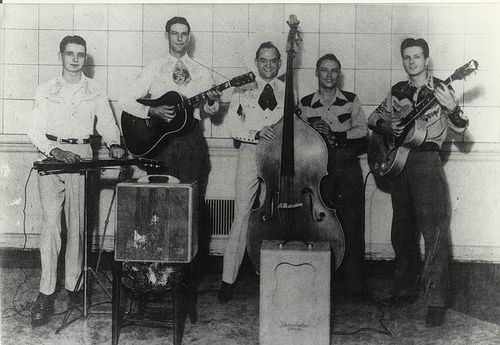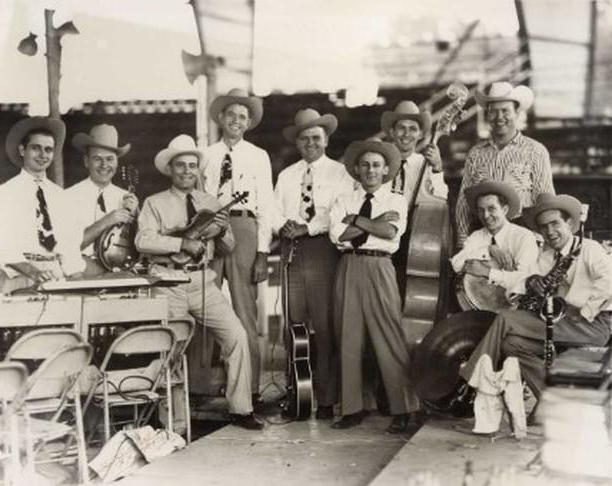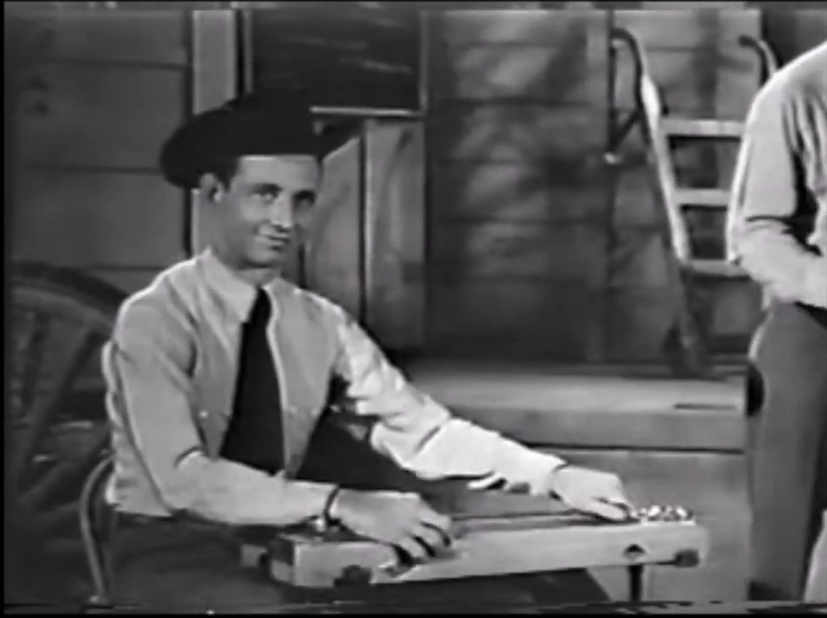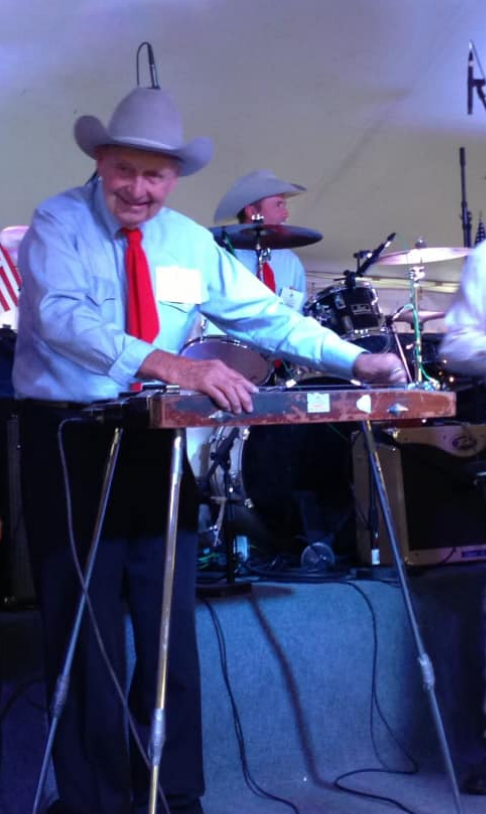Bobby Koefer, steel guitar wizard, RIP
Steel guitarist Bobby Koefer, one of the last surviving members of the Texas Playboys who recorded and toured with Bob Wills, has died at the age of 95. Here is Bobby's obituary, written by western swing historian Buddy McPeters for publication here at BatesLine:
John Robert 'Bobby' Koefer, passed away Saturday morning March 16, 2024, at St. Charles Medical Center Hospital in Bend, Oregon after a recent illness. He was a Bend resident for over 35 years.
Mr. Koefer was born on August 18, 1928, in Clay Center, Kansas. He was the son of Josephine (nee Dakin) & John Koefer who were farmers in Clay County where Bobby spent his early childhood. In his early teens ca. 1941-42 his family moved to Depoe Bay, Oregon.
In his preteen years in rural, sparsely populated Clay County, Koefer took an interest in music after hearing Hawaiian steel guitar records on the Hawaii Calls radio program. Other records inspired him including those featuring steel guitarist Leon McAuliffe with western swing band Bob Wills and his Texas Playboys in Tulsa, OK. Bobby heard their daily radio broadcasts from Cain's Ballroom over KVOO and many of their records. Especially the instrumental recordings with Leon's playing on 'Steel Guitar Rag' from 1937 and the original Wills version of 'San Antonio Rose' from 1938 without vocals. They caught his ear when he heard Leon's exciting steel guitar solos and that famous Bob Wills holler, "Take it away, Leon!" Bobby vowed that he would learn to play the steel and do it well. He vowed someday he would play steel with Wills as a Texas Playboy bandmember, and that Bob would also holler out his name on records. The rest of the story is the stuff legends are made of!
In the late 30's Koefer bought a steel guitar via mail order. When it arrived, there was no instruction book, no steel bar to slide on the strings and no picks. He had no teacher and no mentors to show him how to properly tune the steel or how to go about playing it. He didn't know anyone who played the steel. Strictly self-taught and self-educated about music, relying on his instincts, he took the bull by the horns. He convinced the owner of a local machine shop to make a four-inch polished piece of angle iron to use in place of a steel bar to slide on the strings. Thumb picks were acquired via mail order as there were no music stores nearby.
He set out on his own, all alone, experimenting and discovering how to get the steel guitar sounds he heard on the radio. He made up his own tunings, found his own chords and discovered how to play the melodies dear to his heart. Soon he began to play his own steel guitar licks and made up his own solos. In the process he formulated his own unorthodox approach to playing the instrument which was completely unique and original. Many of his dynamics and techniques to this day are still his own and few have ever been able to duplicate or replicate his style or his sound. He was a readily identifiable steel player who only needed to play one or two notes and instantly people knew it was him playing.

After his family moved to the Oregon coast he began playing in bands in the area. He wound up traveling around the country playing music. In 1947 he was 19 years old and made his first recordings in Dallas with western swing bandleader Homer Clemons & His Texas Swingbillies, 'Operation Blues' b/w 'Little Beaver' on the Blue Bonnet label. Both feature Koefer's jaw-dropping steel guitar style. Stints with Bill Boyd's 'Cowboy Ramblers' and Jim Boyd's 'Men of the West' and other DFW region bands followed.

In 1950 while playing in Indiana with Tex Justice word came that Bob Wills needed a steel player to replace departing Billy Bowman who had been drafted. Bobby called Wills who sent him train fare to Little Rock to audition. Bob hired him and he played with the Texas Playboys until Bowman returned from the Army in 1952. With Wills he made recordings for MGM, notably 'Hubbin' It' and remakes of popular Wills fiddle tunes 'Twinkle Star' and 'Brown Skin Gal', featuring a stunning steel solo by Koefer which elicited Wills hollering out his approval, "Ah, Bobby, Mr. Koefer! Ah, Let's gopher!!" Koefer was also featured performing in seven early music video film shorts aka 'soundies' with Wills & his Texas Playboys for Snader's Telescriptions in 1951. He is both seen and heard to great advantage with his captivating solo on 'Deep Water' and his chilling intro and fills on 'Blue Prelude' which are noteworthy.

In 1952 he joined Pee Wee King & his Golden West Cowboys band for three years. They recorded for RCA and were regulars on the Grand Old Opry. Bobby was featured well in King's records, particularly hot jazz and western swing arrangements of 'Flying Home', 'Seven Come Eleven', and 'Farewell Blues'. In 1955 he joined Billy Gray & His Western Okies in who had a residency at a dancehall in Dallas. He stayed a year racking up more recordings including 'Bandera Shuffle', 'Tippin' In' and his own steel guitar instrumental composition 'Curtain Call', a favorite of steel guitarists far and wide who consider it a standard like 'Steel Guitar Rag'. In 1956 Bobby led his own group the 'Hi-Ho Four' as the house band at the 'Hi-Ho Club' in Wichita, KS for 5 years playing six (& sometimes seven) nights a week. He played C&W, western swing, rockabilly & early rock music and made a few records on the 'Hi-Ho' label. After five years, playing night after night, the club suffered dwindling audiences, had fewer dance patrons and ever-changing music styles evolving more into rock and roll, he decided he needed a change and called it quits.
He moved to Alaska in 1961 and stayed for over 25 years. He played with some local musicians briefly in Anchorage. Then he spent 5 years far from civilization living in relative isolation among primitive native Eskimo's. He completely immersed himself in their culture on Little Diomede Island in the Bering Strait, (2 miles from Soviet Russia) where he participated in village hunting parties during the harsh winters, living in igloos and working on their fishing boats.
He eventually moved inland near Fairbanks where he worked in canneries as well as construction. He also drove a forklift for a sand and gravel supplier where he became shop foreman and union shop steward. He worked there 20 years and retired in 1986. He was away from the music world for so many years, people made up stories including one tall tale that after he hit a gold strike, he buried his steel guitar and even had a funeral for it, vowing to never play again. Of course it was a myth. One that legends are made of.
Koefer and his steel guitar survived the 9.2 Great Alaskan Earthquake and post-quake Tsunami of March 1964. Later while in the Fairbanks area he lived in a rural one-room igloo located in a predominately native populated Eskimo village and played his steel guitar almost every evening after his workday at the gravel pit was thru. When he stepped back into civilization a quarter of century later, he would return as fresh and exciting on his steel as he was the day he left Wichita and headed for the Land of the Midnight Sun.
 Post retirement by mid-1986 Koefer moved to Idaho to take care of his terminally ill mother. In 1989 he moved to a cabin in Bend where he resided for over 35 years. He began to reconnect with old musical friends and former fellow bandmates. Soon he was back on the circuit playing at Bob Wills music events, Texas Playboy band reunions, Western Swing Society gatherings and Hall of Fame concerts all over Texas, Oklahoma, California, and other states, plus the annual Steel Guitar Conventions in St. Louis.
Post retirement by mid-1986 Koefer moved to Idaho to take care of his terminally ill mother. In 1989 he moved to a cabin in Bend where he resided for over 35 years. He began to reconnect with old musical friends and former fellow bandmates. Soon he was back on the circuit playing at Bob Wills music events, Texas Playboy band reunions, Western Swing Society gatherings and Hall of Fame concerts all over Texas, Oklahoma, California, and other states, plus the annual Steel Guitar Conventions in St. Louis.
Everyone was stunned at his abilities and talents which had not diminished in any way. If anything, he had actually gotten better if that were possible. One fellow musician Tom Morrell remarked that "Koefer is either an alien or a time traveler. To have come on the scene from out of nowhere as a kid in the mid-1940's, with his incredible steel guitar techniques and then just disappear 20 years later into the wilderness of Alaska for well over two and a half decades. And then return to the scene just like he stepped out of a time-warp or a spaceship with all the talent and expertise he had before, and he shows up sounding better than ever with even more technique and command of the instrument! Who does that? Only one man I know of, Mr. Bobby Koefer!"
For nearly 30 years after his return in 1989 he was on the go playing concerts with Leon Rausch & The Texas Playboys, Truitt Cunningham & San Antonio Rose Band, Billy Mize, Tommy Allsup, Dayna Wills, Tom Morrell, Johnny Gimble, Luke Wills, Eldon Shamblin and performing with many other artists including The Hot Club of Cowtown making new recordings. He was admired and respected by his steel guitar heroes as well as his peers and was a mentor and teacher to many up and comers on the instrument like steel guitarist Rose Sinclair. He was well known for his trademark quip, "You don't have to be good; you just have to sell it!"
Bobby was inducted in the Steel Guitar Hall of Fame in 2004, the Seattle based North West Western Swing Music Society Pioneers of Western Swing Hall of Fame in 1992. He was also inducted in the Sacramento Western Swing Society Hall of Fame in 1990.
Over the years Koefer had become a world traveler always seeking a new adventure whether river rafting down the Amazon or kayaking the wild Colorado, scaling the Alps or the Andes, there was always one more trek to make, a vast desert to cross or a jungle to go on safari in, another mountain to climb, or another pyramid to go see in some exotic land. Rumor has it that he actually climbed Mt. Everest - which upon being asked if it was so he never admitted it nor did he deny it.
In the last decade Koefer began to slow down due to his advanced age and a few health issues which made travel difficult. But he still retained his high energy, his positive attitude, his quick razor-sharp wit and his friendly nature right up to his final days. He was humble to a fault and always kind and considerate to those around him both near and afar. He leaves behind untold numbers of admirers of his music and good friends from all walks of life across the globe.
Mr. Koefer was preceded in death by his mother Josephine Dakin Koefer Avery (29 April 1988) and his father John Koefer (29 December 1949)
He is survived by his loving wife of 24 years Judy of Bend, OR, a son Gregg Koefer (wife Sandy) of Midlothian, TX, a daughter Tracey Hartgrave (husband Cliff) of Terrell, TX, as well as 7 grandchildren and 8 great grandchildren.
No memorial services were held or planned.
We thank Judy Koefer, Bobby's widow, for her invaluable insight and input into this account of Bobby's life and career.
Some personal notes from Michael Bates: My wife and I first saw Bobby Koefer perform with many other Texas Playboys as part of the Cherokee Strip Land Run Centennial in Ponca City, September 18, 1993. We had driven over to watch the centennial parade down Grand Avenue, and then stayed for Riders in the Sky at the restored Poncan Theater. As soon as that was over, we drove to see the Texas Playboys at the Hutchins Auditorium: Truitt Cunningham led the band that included Koefer, Luke Wills, Eldon Shamblin, Clarence Cagle, Curly Lewis, Glenn "Blub" Rhees, Bobby Boatright, and Casey Dickens. Koefer performed his wild rendition of the Hawaiian War Dance as part of the festivities. The same band made appearances that month at the Texas Playboys reunion at the Constantine Theater in Pawhuska and the Belle Starr Theater near Eufaula.
During that era and into the mid-2000s, Koefer often flew in from Oregon to join the Texas Playboys for the annual Bob Wills Birthday celebration at Cain's Ballroom. He was also a regular at the Bob Wills Day celebrations every April in Turkey, Texas. I wrote about taking my family, including our roly-poly three-month old, to see Bobby perform with the Texas Playboys in April 2006, outside the Million Dollar Elm casino in Sand Springs; in my March 2007 column previewing the Bob Wills Birthday bash at Cain's Ballroom, another item promoting the gig, and in a report following the event with line-up and set list; March 2009 Bob Wills Birthday. He was not at the the March 2010 Bob Wills Birthday at Cain's; someone connected with the band told me that, as Cain's reduced the annual birthday bash from two nights to one, it was uneconomical and a strain for Bobby to fly out from Oregon for just one performance. Bobby continued to go to Turkey every April to perform at the multi-day Bob Wills Day festivities.
Here's a playlist featuring Bobby Koefer over the years, starting with his solo on Sittin' on Top of the World, continuing with several more of the 1951 Snader Telescriptions films with Bob Wills and His Texas Playboys and yodeler Carolina Cotton, some Texas Playboys reunion performances at Pawhuska circa 2000, a couple of his infamous and hilarious renditions of the Hawaiian War Dance, one from 2001 with the San Antonio Rose band in Sacramento, one from Bob Wills Day 2011, my video of "Take Me Back to Tulsa" at the 2006 Million Dollar Elm performance, a 2006 performance of "Boot Heel Drag," and finishing with a beautiful rendition of "Sleep Walk" with Jim Paul Blair, where you get a good look at Bobby's technique. He points at the fingerboard the way Babe Ruth called his home runs.
Here's Bobby and friends in a more mellow mood, from 2002: "Stardust," kicked off by Tulsa's Mike Bennett on trumpet.
DISCOGRAPHY:
- Bobby Koefer discography, including work with Tom Morrell and the Time-Warp Top Hands
- Bobby Koefer on Bob Wills and His Texas Playboys discography
- Bobby Koefer on Pee Wee King's discography
- Bobby Koefer on Bob Newman's discography
- Bobby Koefer on Carolina Cotton's discography
- Bobby Koefer on Tom Morrell and the Time-Warp Top Hands discography
- Bobby Koefer on Leon Rausch's discography
- Bobby Koefer with former Texas Playboys on Johnny Patterson's discography
- Bobby Koefer on Brady Bowen's discography
- Bobby Koefer on Becky Kilgore's discography
0 TrackBacks
Listed below are links to blogs that reference this entry: Bobby Koefer, steel guitar wizard, RIP.
TrackBack URL for this entry: https://www.batesline.com/cgi-bin/mt/mt-tb.cgi/9181